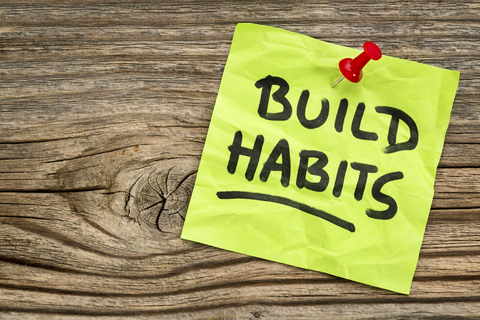Forget Resolutions, Build Good Habits
Approximately 50 percent of us will make New Year’s resolutions this year, many of which will focus on getting healthier. “I’ll go on a diet,” “I’ll work out every day,” “I’ll cut out all sugar.” We’ve all heard these resolutions, if we haven’t made them ourselves.
Unfortunately, by the second week of February, 80 percent of us who made resolutions will have likely reverted back to our pre-New Year’s habits. It isn’t that we lack the commitment or we get too busy—our brains just aren’t designed to carry through on the resolutions we make.
Why Most New Year’s Resolutions Fail
The top 5 New Year’s resolutions for 2016 were:
Staying fit/healthy
Losing weight
Spend less, save more
Enjoy life to the fullest
Spend more time with family
The reason 80 percent of people will abandon these resolutions by February is because they are all abstract aspirations—not behaviors—and aspirations don’t translate directly into habits.
A study featured in the European Journal of Social Psychology found that healthy habits can take anywhere from 18 to a whopping 254 days for a behavior to become automatic.
254 days might seem like a long time to adopt a new behavior, but more than half of the participants were able to make their new behavior into a habit between 18-66 days
This means that you, too, can create healthy habits that stick, and it won’t take too much time if you have a solid strategy.
This article will show you 8 strategies that explain exactly how to create healthy habits that stick:
-
Be Action Oriented
A mistake many people make is to make their goals results-oriented rather than action-oriented.
A results-oriented goal would be something like “Lose 50 pounds,” or “Never have another pimple,” whereas an action-oriented goal will be something like “Go to yoga 3 times a week,” or “Eat less inflammatory foods.”
The problem with results-oriented goals is that they have a short shelf-life and don’t actually help you achieve optimal health.
Action-Oriented goals, on the other hand, will change the way you live your life. Action-oriented goals will give you long-lasting benefits that go beyond what’s showing on the outside (and you’ll probably see the results you desire, too).
-
Break it Down: See The Big Picture, Take Small Steps
Before you set a goal, take a moment to step back and think big. What kind of person do you want to be? What kind of things does that person do that make them that way?
Chances are, the type of person you want to be does a whole lot of things differently than you currently do.
This realization can be really overwhelming, and discourage you from doing anything at all, but you shouldn’t let it.
Instead, recognize how much you’ve evolved from who you used to be, and know that you will continue to evolve in the future.
Keep the big picture of the type of person you want to be in your mind as inspiration, and then set very small goals to guide your transformation into that kind of person.
Small goals are important, because if you aim for something too big you won’t believe in your ability to reach those goals, and are more likely to become overwhelmed and discouraged along the way.
You don’t have to be a superhero tomorrow. But when you start small, over time your accumulated efforts will pay off.
-
Create Context
When it comes to habits, it’s important to create context. A recent study showed that healthy habits were much more sustainable when they took place in the midst of other routines.
Thus, when you want to reach a new health goal, think about specifically when and where you will integrate the associated behaviors.
For example, instead of saying “I want to run more,” say “When I get off of work on Tuesdays and Thursdays, I will go to the park and run 2 laps around the perimeter.
Instead of saying “I will cut out sugar,” say “When I crave sugar I will drink a glass of water and wait 20 minutes to see if the craving goes away.”
The more specific you are about your goals, the more likely they will happen.
-
Make Your Goal a Necessity, Not an Option
When it comes to willpower, giving yourself options is one of the worst things you can do. And when it comes to healthy habits, willpower is one of the biggest obstacles to overcome.
To help yourself make better choices from day to day, give yourself less options.
When it comes to your health goals, you might want to set it at two levels. For example, if you want to exercise more you can give yourself the option of going for a 30 minute walk or a 10 minute jog every morning before breakfast.
Notice that in this scenario, doing nothing is not an option!
-
Stick to A Schedule
My secret to productivity is by writing everything down. If it’s not on my schedule, it’s not in my life.
Same goes for new behaviors. So if you want to go the gym 3 days a week, write it on your schedule. If it’s not written down, it’s less likely to happen.
Another benefit of having a schedule is creating a more consistent routine. This ties the last two strategies together.
When you have a consistent routine, you limit your choices and create context for any habit you want to integrate into your life. If you write and follow a schedule, you are much more likely to succeed.
-
Be Proactive Every Day
You’ll be totally pumped to work toward your goal on some days, but it’s impossible to keep up a high pace over the long term. This means that despite your best intentions, you will experience ups and downs, and it is inevitable that it will become harder to motivate yourself after a while.
To mitigate this, decide ahead of time what the minimum action is to satisfy your goal, and make sure you do it every day.
The only way your habit will stick is if take action even, and especially, when you don’t really want to.
-
When You Fall Down, Get Right Back Up
Some days are easier than others, and sometimes you may not make any progress on your goal at all, or even step back a few paces.
When you fall off track, it’s important not to give up entirely. Instead, figure out exactly what trigger made you give up.
For example, say you want to go sugar free but you succumbed to the allure of an ice-cream cone yesterday. Instead of giving up on your goal, use this slip-up as a learning opportunity and make a plan.
In this example, you might decide that the time you have a sugar craving you’ll have a cup of unsweetened peppermint tea or eat an orange before you reach for the ice-cream.
-
Start Today
Procrastination is the #1 reason people don’t achieve their health goals. So don’t start tomorrow. Start today. Don’t wait, start right now!
If you make a specific plan, set reasonable goals, and keep the big picture in mind, you’ll reach your health goals easily.
Request a complimentary first session at Vertex Fitness, Voted the BEST Personal Training Studio on the Main Line
Click HERE and we will schedule a session to try it yourself
Complimentary First Workout Session








Leave a Comment